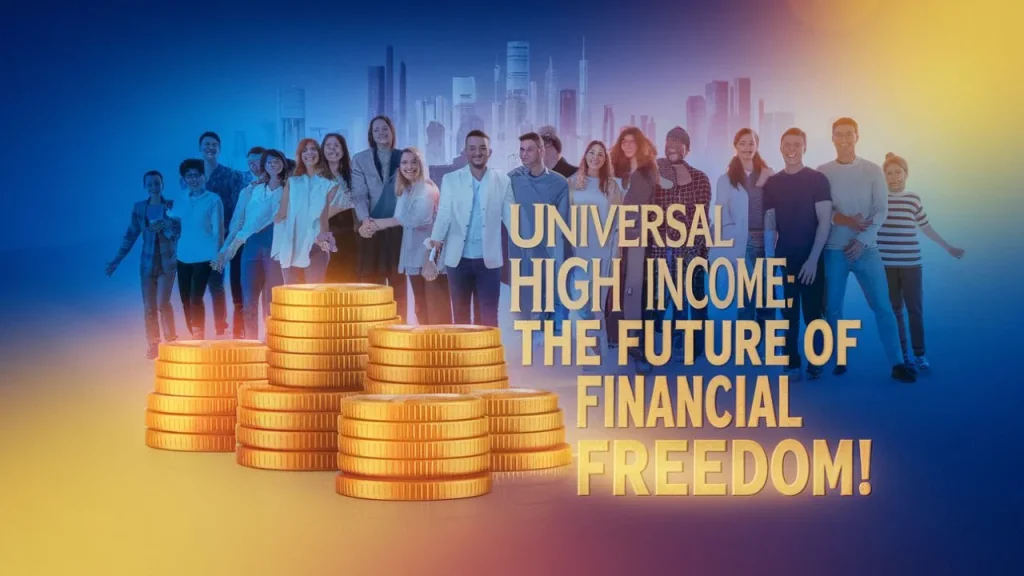In today’s world, many people struggle to earn enough money to live a happy and comfortable life. The gap between the rich and the poor is growing, and this creates problems for everyone. Some experts believe that a solution to this issue is something called Universal High Income (UHI). This idea is about giving everyone a fixed amount of money regularly, no matter if they have a job or not. But how does it work, and can it really help? Let’s find out.
WHAT'S IN THIS POST ?
What is Universal High Income?
Universal High Income is a plan where every person in a country receives a set amount of money from the government. This money is given to everyone, whether they are working, studying, or even unemployed. The goal is to make sure everyone has enough to cover their basic needs like food, housing, and healthcare.
This idea is not new. Some countries have already tested similar plans, and the results have been interesting. For example, in Finland, a two-year experiment showed that people who received a basic income felt less stressed and more confident about their future.

How Can Universal High Income Help?
Universal High Income can bring many benefits to society. Here are some of the ways it can make a difference:
- Reducing Poverty: Many people live in poverty because they don’t earn enough money. UHI can help by giving them a safety net.
- Improving Mental Health: Financial stress can make people feel anxious or depressed. With UHI, people can feel more secure and less worried about money.
- Encouraging Creativity: When people don’t have to worry about basic needs, they can focus on their passions, like starting a business or learning new skills.
However, some people worry that UHI might be too expensive or could make some people stop working. These are valid concerns, and more research is needed to find the best way to make UHI work.
Countries Testing Universal High Income
Here’s a table showing some countries that have experimented with Universal High Income or similar plans:
| Country | Year Tested | Results |
| Finland | 2017-2018 | People felt less stressed and more confident. |
| Canada | 2017-2019 | Improved health and well-being in the community. |
| Kenya | 2016-Present | Ongoing project showing positive effects on education and health. |
| United States | 2020 | Small-scale tests showed reduced financial stress. |
| Germany | 2021 | Pilot program to study the impact on employment and mental health. |
Challenges of Universal High Income
While UHI sounds like a great idea, there are some challenges to making it work:
- Cost: Giving money to everyone can be expensive. Governments need to find ways to fund UHI without raising taxes too much.
- Work Motivation: Some people worry that if everyone gets free money, they might stop working. However, studies show that most people still want to work, even with UHI.
- Implementation: Setting up UHI requires careful planning to make sure it helps everyone equally.
Universal High Income vs. Traditional Welfare
Here’s a comparison between Universal High Income and traditional welfare systems:
| Aspect | Universal High Income | Traditional Welfare |
| Eligibility | Everyone receives it, no conditions. | Only for those who meet specific criteria. |
| Administration | Simple and less bureaucratic. | Complex and requires more paperwork. |
| Impact on Work | Encourages flexibility and creativity. | May discourage work due to strict rules. |
| Cost | High initial cost but simpler to manage. | Lower cost but harder to manage. |
Why Universal High Income Matters
Universal High Income is more than just a way to give people money. It’s about creating a fairer society where everyone has a chance to live a good life. By reducing poverty and stress, UHI can help people focus on what really matters: their health, happiness, and dreams.
Conclusion
High Income is an exciting idea that could change the way we think about money and work. While there are challenges to making it work, the potential benefits are huge. From reducing poverty to improving mental health, UHI could make the world a better place for everyone.
FAQs About Universal High Income?
Universal High Income is a plan where every person receives a fixed amount of money regularly from the government, regardless of their job or status.
Unlike welfare, UHI is given to everyone without any conditions. It’s simpler and doesn’t require people to prove they need it.
Many countries are testing UHI, and the results so far are promising. However, more research is needed to understand how it can work on a larger scale.




